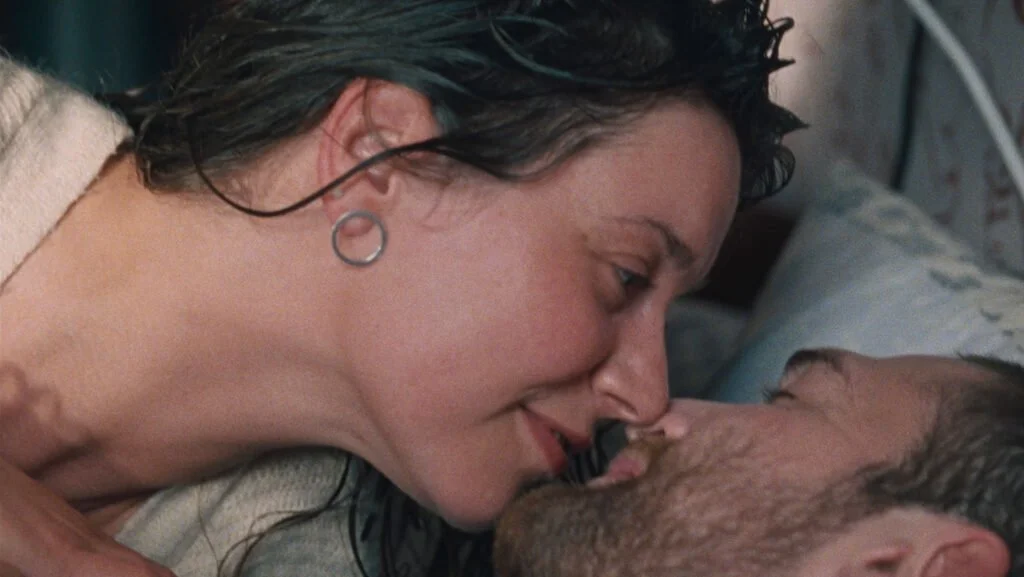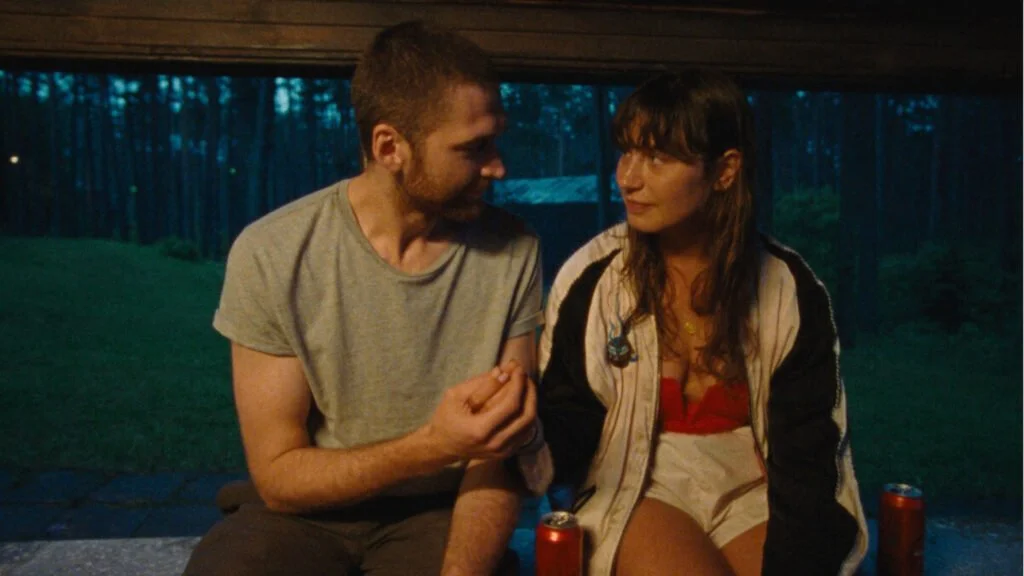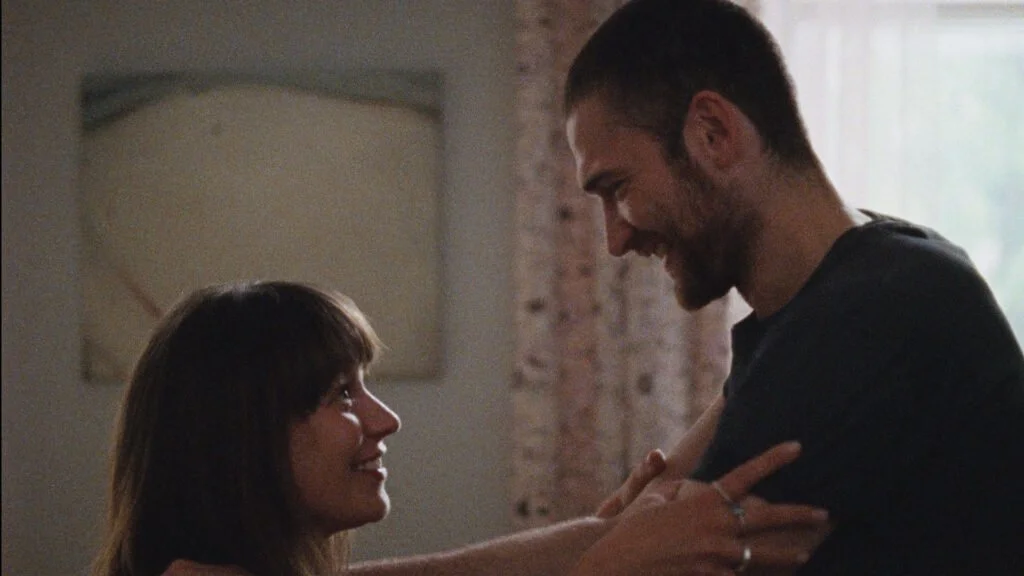‘Slow’ Review: Lithuania’s Latest Oscar Entry Gracefully Explores Alternative Expressions of Desire
Courtesy of KimStim.
In recent decades, filmmakers worldwide have increasingly used their work to investigate queer experiences to varying levels of success. Through these onscreen explorations, audiences have opened their eyes to walks of life that went undepicted in the largely heteronormative cinema that dominated the medium for roughly its first hundred years. While the LGBT branches of the non-heterosexual acronym have been probed in films from All of Us Strangers to A Fantastic Woman, the rest of the initialism (QIA2S+) has gone vastly underrepresented on the silver screen. With her sophomore feature film, Slow, Lithuanian screenwriter and director Marija Kavtaradze shines a considerate, captivating light on a blossoming romantic relationship between a young dancer, Elena, and a sign language instructor, Dovydas, which becomes complicated by their manners of navigating Dovydas’ asexuality. Through her intimate filmmaking approach with Slow, Kavtaradze imagines a revitalized perspective on romantic passion and desire outside of heteronormative expectations.
Elena (Greta Grinevičiūtė) lives in Vilnius, where her passion for contemporary dance has become lucrative enough to evolve into her profession. She finds herself craving the carnal lust of male lovers, but they often leave her feeling unsatisfied and detached. One day, Elena teaches a class of deaf adolescents, and their sign-language translator, Dovydas (Kęstutis Cicėnas), catches her eye. Dovydas is nothing like the men that Elena typically finds herself attracted to: he is inquisitive, spirited, and profoundly tender. Quickly, a mutual chemistry between Elena and Dovydas begins to grow, and he shares with her his asexual identity. From his lifelong experience, Dovydas has never felt indomitable forces of sexual urge or expression towards anyone, he simply “doesn’t need it.”. Dovydas’ revelation shakes Elena’s concepts of desire, but she cannot stay away from him for long. The two embark on a romantic relationship, embarking into uncharted territory as their connection develops beyond the traditional conventions of attraction, lust, and togetherness.
Courtesy of KimStim.
Through its approach to filmmaking and character-building, Slow assembles a romantic drama that rejects the conventions typically found in love stories, creating a wholly modern portrait of what a committed relationship can be. Essentially a two-hander between Elena and Dovydas, Kavtaradze cinematically exercises how intimate moments can be communicated between two people: sharing a cigarette in the rain, holding hands for the first time, and lying in bed all day. These small but potent interactions become the basis for the love between Elena and Dovydas, solidifying their bond more acutely than any sexual act could. Slow also works to establish other forms of non-sexual intimacy that its central pair can communicate through, with Elena’s contemporary dance and Dovydas’ skill for sign language, compelled by his deaf brother. This accentuation of their means of expression works to create more fully realized and complex characters.
Slow’s lean screenplay allows for the brilliant chemistry to play out between its focal romance, which could have proven catastrophic with miscasting, which certainly is no problem here. Grinevičiūtė, an actual dancer and choreographer in Lithuania, imbibes her real-life experience into her character with an unflashy intellect. Through her time in the studio, the viewer can understand many facets of Elena’s character through her dancing: the stature of her body, her sensual spirit, and her passion for the medium. This authentic perspective bleeds into other elements of Elena, specifically through her relationship with her stoic, stereotypically Eastern European mother, who is only briefly featured. Elena’s mother lacks support for her daughter’s passion and career, openly disproving Elena’s body type, which she believes is not that of a dancer. The insecurity instilled in Elena by her mother influences her self-esteem and relationships with men, ultimately becoming a significant obstacle in her efforts to make things work with Dovydas.
While Elena’s character holds much of the film’s central perspective, that of Dovydas is also built with much care and deliberation. Kavtaradze’s screenplay gives Cicėnas the space to create a flawed, nuanced character in Dovydas, entirely assertive of certain boundaries while wavering on others. Like many with components of self-identity in the real world, Dovydas often struggles to verbalize his feelings or convictions to Elena as they both navigate a redefined version of a romantic partnership for the first time. Dovydas’ self-doubt in the face of social conventions often manifests through jealousy and feelings of masculine insecurity, particularly when he pressures himself to keep Elena satisfied for fear of losing her.
Courtesy of KimStim.
The infrastructure used to construct Slow points to Kavtaradze’s skill and understanding as a filmmaker. With the asexual community so rarely highlighted in popular culture, the director had to do quite extensive research to portray an authentic asexual experience through Dovydas’ character. Kavtaradze began with internet research into asexual perspectives, which then led her to interview members of the community and utilize AVEN (Asexual Visibility and Education Network) resources. These research methods culminate with a film that is both sensitive and sincere through its probings of alternative expressions of sexual identity and how they work with modern understandings of relationships. While the atypical romance at the center of Slow could have materialized in many different forms, its accentuation of a queer narrative should be platformed. Even still today, Lithuania holds onto many forms of social and legal disenfranchisement of the 2SLGBTQIA+ community: Much of Eastern Europe does not recognize same-sex marriage or transgender rights. Slow’s release in its country of origin will hopefully work towards building more understanding in the region of non-heteronormative or atypical lifestyles and relationships.
Captured on grainy 16mm film with the soft, dappled light of summer, Slow is a gorgeous exploration into the messiness that can be born from new love, albeit with a fresh standpoint that holds much importance in the ever-evolving contemporary world. Kavtaradze’s writing and direction work harmoniously with the delicately impressive performances of her central duo to create an endearing romance that almost combines Rohmerian elements with forward-thinking concepts of gender and sexual expression, culminating in a must-see film as we head into the warmer months.
4.5/5
Slow premiered at the 2023 Sundance Film Festival, where it won the Directing Award in the World Cinema Dramatic Competition. KimStim will distribute the film in the United States and Canada beginning on Friday, May 3. Watch the Slow trailer below and click here to find a showtime near you.


